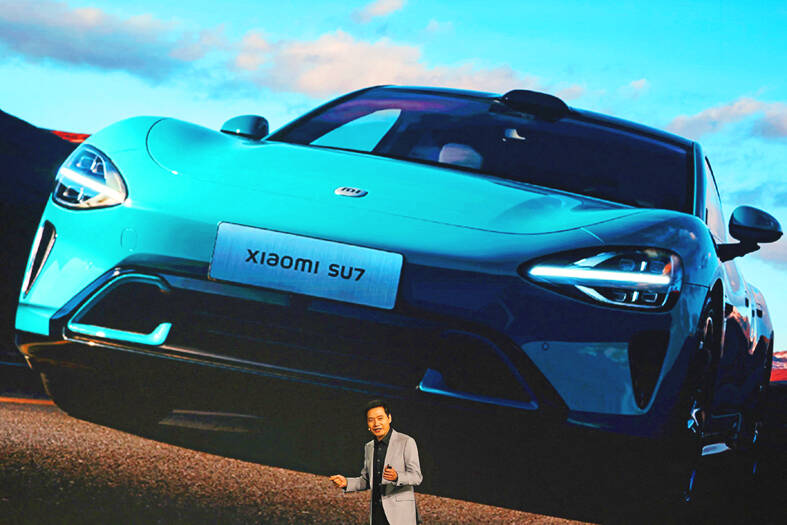Chinese consumer electronics giant Xiaomi Corp (小米) unveiled its first four-wheeled electric vehicle (EV) yesterday, with company founder and chief executive officer Lei Jun (雷軍) saying it has ambitions to become a global automotive powerhouse, despite fierce competition at home.
Beijing-based Xiaomi, which is the world’s fourth-largest smartphone manufacturer, is also a leading provider of tablets, smartwatches, headphones and electric scooters.
The company in 2021 announced its intended foray into EVs, joining a trend that has seen several major Chinese tech companies pivot toward the highly competitive sector.

Photo: REUTERS/Florence Lo
Lei took to the stage in Beijing yesterday to unveil the SU7, a sedan that is scheduled to enter the market in 2025.
The model is integrated with Xiaomi software to enable functionality across the firm’s range of devices and would be produced by local manufacturer BAIC Group (北汽集團), the company said.
“The goal is to become one of the world’s top five automotive manufacturers through 15 to 20 years of hard work,” Lei said.
The SU7’s batteries are to be supplied by China’s largest electric automaker, BYD Co (比亞迪), as well as domestic battery giant Contemporary Amperex Technology Co (寧德時代).
Many top tech firms in China — which is the world’s largest automotive market — have invested recently in the country’s EV sector.
BYD was the undisputed leader of China’s EV market last month with more than 300,000 models sold, ahead of Tesla Inc’s more than 80,000, China Association of Automobile Manufacturers data showed.
Founded in 2010, Xiaomi has achieved rapid growth through its strategy of marketing high-end devices at affordable prices, which were initially sold directly through online channels.
The firm was placed on a blacklist by the US in 2021 due to alleged links to the Chinese military.

Nvidia Corp chief executive officer Jensen Huang (黃仁勳) on Monday introduced the company’s latest supercomputer platform, featuring six new chips made by Taiwan Semiconductor Manufacturing Co (TSMC, 台積電), saying that it is now “in full production.” “If Vera Rubin is going to be in time for this year, it must be in production by now, and so, today I can tell you that Vera Rubin is in full production,” Huang said during his keynote speech at CES in Las Vegas. The rollout of six concurrent chips for Vera Rubin — the company’s next-generation artificial intelligence (AI) computing platform — marks a strategic

Shares in Taiwan closed at a new high yesterday, the first trading day of the new year, as contract chipmaker Taiwan Semiconductor Manufacturing Co (TSMC, 台積電) continued to break records amid an artificial intelligence (AI) boom, dealers said. The TAIEX closed up 386.21 points, or 1.33 percent, at 29,349.81, with turnover totaling NT$648.844 billion (US$20.65 billion). “Judging from a stronger Taiwan dollar against the US dollar, I think foreign institutional investors returned from the holidays and brought funds into the local market,” Concord Securities Co (康和證券) analyst Kerry Huang (黃志祺) said. “Foreign investors just rebuilt their positions with TSMC as their top target,

Enhanced tax credits that have helped reduce the cost of health insurance for the vast majority of US Affordable Care Act enrollees expired on Jan.1, cementing higher health costs for millions of Americans at the start of the new year. Democrats forced a 43-day US government shutdown over the issue. Moderate Republicans called for a solution to save their political aspirations this year. US President Donald Trump floated a way out, only to back off after conservative backlash. In the end, no one’s efforts were enough to save the subsidies before their expiration date. A US House of Representatives vote

REVENUE PERFORMANCE: Cloud and network products, and electronic components saw strong increases, while smart consumer electronics and computing products fell Hon Hai Precision Industry Co (鴻海精密) yesterday posted 26.51 percent quarterly growth in revenue for last quarter to NT$2.6 trillion (US$82.44 billion), the strongest on record for the period and above expectations, but the company forecast a slight revenue dip this quarter due to seasonal factors. On an annual basis, revenue last quarter grew 22.07 percent, the company said. Analysts on average estimated about NT$2.4 trillion increase. Hon Hai, which assembles servers for Nvidia Corp and iPhones for Apple Inc, is expanding its capacity in the US, adding artificial intelligence (AI) server production in Wisconsin and Texas, where it operates established campuses. This